
Australian Institute of Marine Sciences (AIMS)
The Australian Institute of Marine Science (AIMS) is Australia’s premiere tropical marine research agency. AIMS plays a pivotal role in providing large-scale, long-term, and world-class research that helps its stakeholders including governments, Traditional Owners, research management organisations, industry, and the wider community, to make informed decisions about the management of Australia’s marine estate.
Its mission is ‘to provide the research and knowledge of Australia’s tropical marine estate required to support growth in its sustainable use, effective environmental management, and protection of its unique ecosystems’. AIMS’ research programs are built around core strengths and strategic capabilities that meet the knowledge needs of stakeholders.

2021 Overview
Highlights for the AIMS-ACEMS partnership, and research and engagements, in 2021 include:
- Completed project “Characterisation of initial periods of recovery within the Great Barrier Reef”, with important output, outcome, and media coverage.
- Successful co-funded project “Supporting Traditional Owner Marine Monitoring Through Two-Way Knowledge Sharing”, with output in progress, workshop planned for 2021, and serving as successful pilot project demonstrating mutual benefits for AIMS-Traditional Owner collaborations.
- ReefCloud.ai collaboration continued with AIMS and ReefCloud won the Asia-Pacific Spatial Excellence Awards (APSEA) Environment and Sustainability award for the Pacific and is a global finalist.
- Three applications to ACEMS funding schemes for new collaborative projects, with new project “Triton, a natural alternative to fight the deadly crown-of-thorns starfish in the Great Barrier Reef?” enabled, delivering important outputs and progressing important research, to continue beyond ACEMS.
- Higher degree research student highlights include a PhD completion, new and continuing HDR, Honours and Vacation Student projects.
- New co-funded positions including for a postdoctoral researcher appointed late 2021.
- National Science Week initiatives including the Great Barrier Reef Citizen Science event.
- AIMS participation in the Centre’s Final Annual Retreat.
- An upcoming PhD student position, and other opportunities for continuing collaborations with ACEMS researchers into 2022 and beyond.
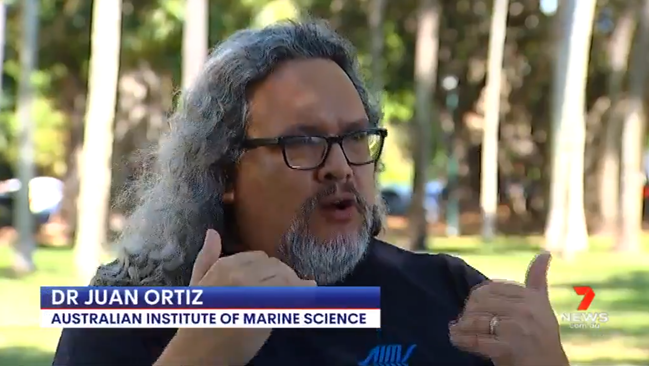
AIMS PI Dr Ortiz explaining the significance of research findings from a collaborative research project
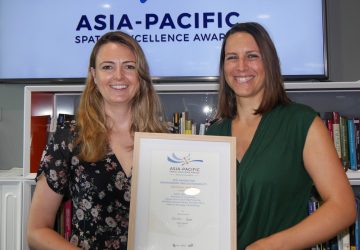
AIMS’ ReefCloud platform wins APSEA Environment & Sustainability award, Pacific Region, & is finalist for the global award in that category.

Queensland Minister for the Environment visiting ACEMS QUT to learn about GBR research & promote citizen science challenge
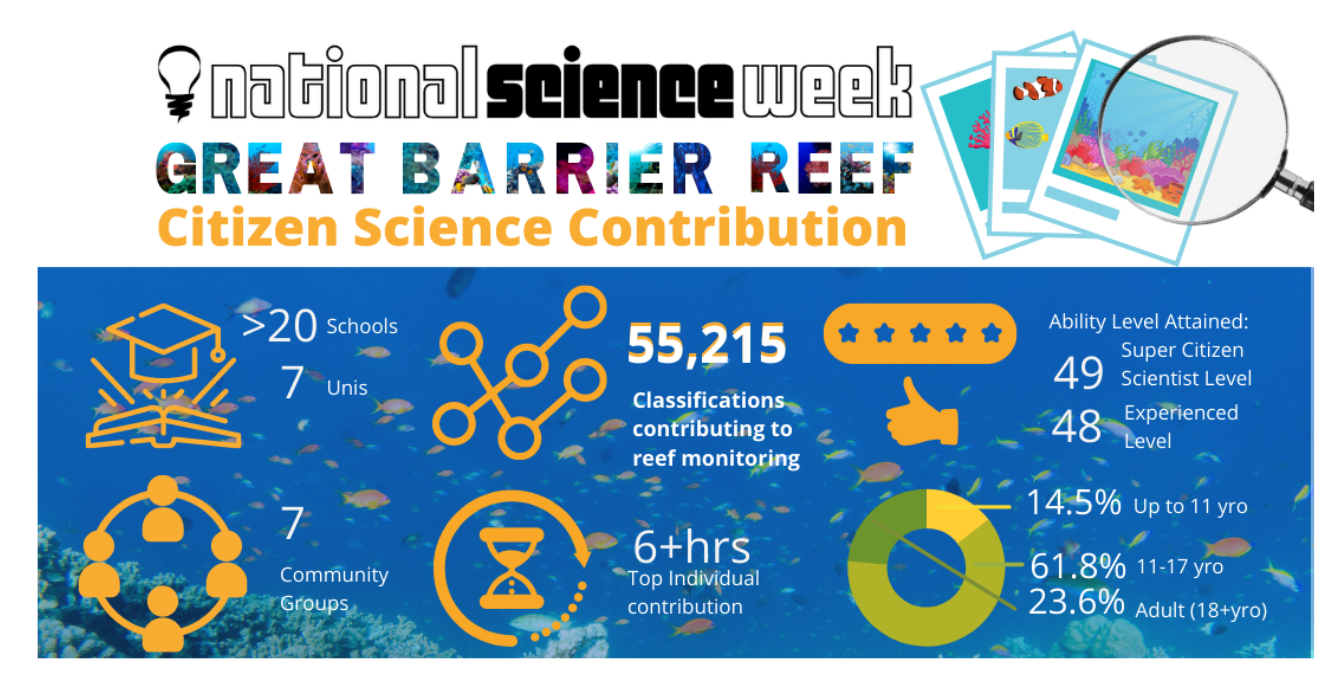
Citizen scientists across Australia helped classify reef images on Virtual Reef Diver, as part of ACEMS National Science Week challenge & celebrations with AIMS and other partners
AIMS and ACEMS’ Research in 2021
Research Project: “Characterisation of initial periods of recovery within the Great Barrier Reef”
AIMS and ACEMS researchers, discovering similar patterns between cancer and coral growth, pursued research on coral recovery. They identified a two-phased recovery pattern following coral reef disturbances, prevalent in around 60% of the Great Barrier Reef’s coral reefs.
This significant and concerning finding has already had important outcomes, including for coral reef monitoring and reporting, and will help inform decision-making, including about resource allocation to help coral reefs recover depending on the recovery pattern exhibited.
Their research findings were accepted for publication in the Journal of Applied Ecology and is expected to appear in print in a 2022 issue. Supplementary materials and media reports about their work can be found at the links below:
- new R code available via the open-source repository Github: https://github.com/davidwarne/Identification-two-phase-recovery
- a joint media release from AIMS and ACEMS
- Channel 7 news segment featuring AIMS PI Juan Ortiz and ACEMS RF David Warne, and this exemplar print media coverage.
Television news story featuring AIMS & ACEMS researchers who discovered two-phase coral recovery

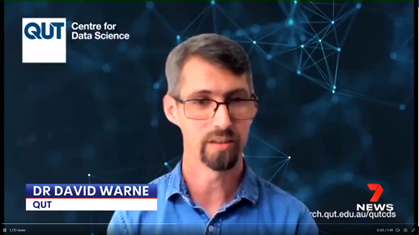
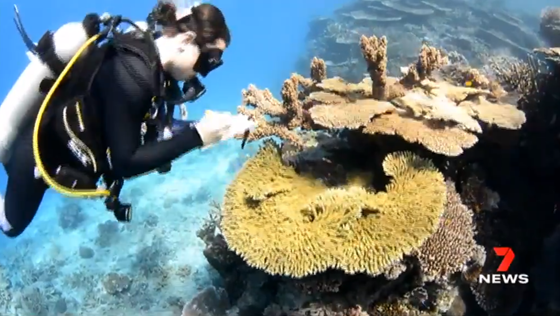
Researchers from AIMS and ACEMS discuss the important findings of their research on coral recovery following disturbances in this Channel 7 news feature, promoted on social media
Research Project: Supporting Traditional Owner Marine Monitoring Through Two-Way Knowledge Sharing
ACEMS has supported a successful AIMS-led pilot project ‘Supporting Traditional Owner Marine Monitoring Through Two-Way Knowledge Sharing’, at the forefront of collaborative defence of Sea Country, with AIMS’ Traditional Owner partners.
Through the Northern Australian Marine Monitoring Alliance (NAMMA), researchers at AIMS and ACEMS have worked in partnership with the Indigenous Bardi and Jawi communities in Northern Western Australia to develop a statistical model to support monitoring and management of Sea Country. The project delivered benefits for both AIMS and its Traditional Owner partners in sharing data.
A key outcome of this work is the analysis of monitoring protocols carried out by the Bardi-Jawi sea rangers to optimally assess sea country health in alignment with the Bardi and Jawi sea country health plan. Through Bayesian hierarchical modelling, AI-based image classification and High-Performance Computing, the research team has provided a detailed set of recommendations to these ranger groups and contributed to the quantification of key health indicators defined by the Bardi and Jawi managers. New monitoring data has been added to AIMS' ReefCloud platform, which can be used by Indigenous communities to care for Country, including to take actions to limit coral decline and protect fish populations.
Additional outputs from this work and final experiments in 2022 will include:
- A paper entitled “Long-term monitoring in Indigenous sea country of northern Australia: precision, power and auto-classification of images and methods” to be submitted to the journal Conservation Biology – this work is being finalised by co-authors from ACEMS, AIMS, and Traditional Owner partners including: Diego Barneche, Jim Underwood, Nicole Ryan, Kathy Cure, James Gilmour, Martial Depczynski, Matt Wyatt, David Warne, Amy Stringer, Mark Case, Bardi Rangers, Frank Weisenberger, Kerrie Mengersen, James McGree, and Rebecca Fisher.
- a Workshop Round Table Discussion to be delivered by ACEMS Members and AIMS at the 2022 International Statistical Ecology Conference (ISEC), to discuss the challenges of power analysis from a Bayesian perspective.
There are several future opportunities for further work continuing beyond the life of ACEMS including:
- The NAMMA initiative is continuing to expand, and there are several other communities that AIMS will be working with in the coming years and ACEMS Members will be well placed and trusted to provide statistical support and collaboration within these projects moving forward.
- New questions around the power analysis, used to assess experimental design of both coral and fish monitoring, have arisen and can be explored in future collaborations between AIMS, NAMMA and QUT Centre for Data Science.
- This work also aligns with the updated Reef 2050 Long-Term Sustainability Plan, with a greater focus on involving Traditional Owners in protecting the Great Barrier Reef (and taking action on climate change).
Research Collaboration: Award-Winning ReefCloud.AI Platform
ReefCloud.ai allows the world’s coral reef monitoring community to work together in real time to improve reef monitoring and management, and uses machine learning and artificial intelligence to analyse photographs of coral reefs to rapidly extract and share data.
ACEMS continued its collaboration with AIMS on its open-access cloud-based platform ReefCloud.ai. ACEMS Members supported the project by assisting with modelling, coding, new data, and the abovementioned successful pilot project which harnessed ReefCloud for data sharing.
ReefCloud.ai won the Asia-Pacific Spatial Excellence Awards (APSEA) award in the Environment and Sustainability category in the Pacific region in 2021. APSEA celebrates the achievements of top spatial information enterprises and individuals. ReefCloud is now a finalist for the global award to be announced in May 2022.
ReefCloud.ai Wins APSEA Award
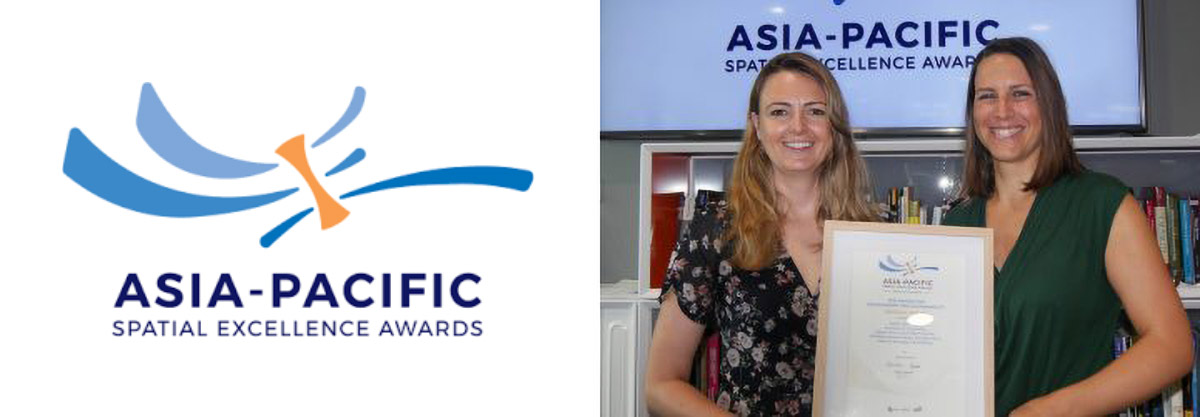
2021 APSEA winners in the Pacific Region. The Award for Environment and Sustainability was awarded for ReefCloud. The winners are: Australian Institute of Marine Science, QUT, Accenture Australia, Palau International Coral Reef Centre, Wildlife Conservation Society Fiji, Marine Ecology Consulting and University of the South Pacific. Pictured accepting the award are AIMS’ Dr Emma Kennedy (left) and ACEMS AI Julie Vercelloni (right).
AIMS will formally launch ReefCloud in Palau in April 2022 at Our Ocean Conference, a high-profile diplomatic event which convenes partners from across the globe to identify solutions to manage marine resources, increase the ocean’s resilience to climate change and safeguard its health for generations to come. For more information on ReefCloud visit: https://reefcloud.ai/
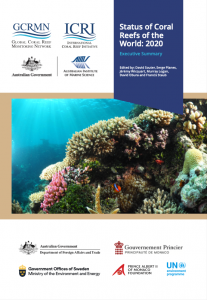
Research Collaboration: Triton, a natural alternative to fight the deadly crown-of-thorns starfish in the Great Barrier Reef?
AIMS and ACEMS commenced a new collaboration on the project “Triton, a natural alternative to fight the deadly crown-of-thorns starfish in the Great Barrier Reef?”, with support from both organisations, including ACEMS’ Ideas Challenge and Research Sprint schemes.
Crown-of-thorns starfish (Acanthaster planci; COTS) are a major cause of coral cover loss on the Great Barrier Reef (GBR). It is essential to investigate new strategies to combat and prevent COTS outbreaks, as current approaches are costly and do not scale. AIMS is currently investigating the endangered giant Triton snail as a biocontrol agent, since it’s a natural predator of COTS whose odour can trigger a chemically-induced flight response in COTS.
This research aimed to:
- investigate the potential of Triton as a biocontrol agent, by using tracking data obtained from AIMS’ video footage to understand the normal behaviours of Triton and COTS in captivity, and their predator-prey interactions, and compare captive and in situ behaviours.
- provide computational means for cleaning, preparing and interrogating the data (or other animal tracking data) at scale.
- provide data visualisation tools.
Highlights of Presentation on the Triton & COTS Collaborative Research Project
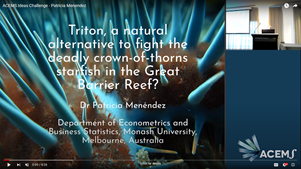
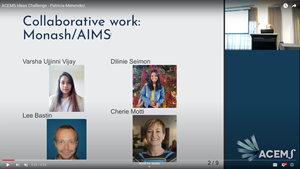
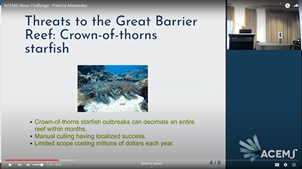
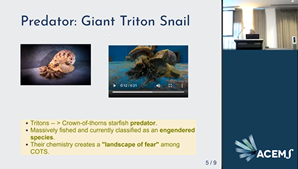
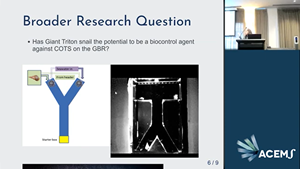
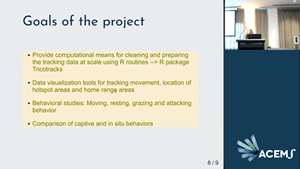
Project Outputs
- Knowledge and tools to help AIMS to establish the COTS biocontrol potential of Triton, including knowledge of both COTS and Triton’s home range (movement speed, tracks, & distance travelled) and behaviour in captivity (e.g., Triton’s searching, halting, grazing, hunting, & attacking) versus in situ.
- Developed algorithms, R routines and an R software package “Tricotraks” for Ethovision video data (to clean and prepare the data, and correct animals’ tracks after paths cross, at scale).
- Interactive dashboard to visualise tracks, home range area, triton attacks and hotspot areas inside the aquarium.
- Future publication (there is a working paper in progress, to be completed early 2022).
- Knowledge from this project is being and will be disseminated to COTS researchers (i.e. conference, publication, direct reporting) and provided to reef managers (i.e., GBRMPA, GBRF).
Project Outcomes:
- Inform GBR management policy and decision making regarding the conservation of Triton and the control of future outbreaks of COTS within the COTS Control Innovation Program (CCIP).
- The project findings will be considered by the Great Barrier Reef Foundation (GBRF) funded CCIP review of ‘Deployment of semiochemical-based biocontrol agents to manage CoTS populations and outbreaks’ led by AIMS.
Future Opportunities:
- Mathematical models and workflows developed by the project lay the foundation for future studies to explore this predator-prey interaction.
- AIMS and ACEMS Monash intend to continue collaborations beyond 2021/ACEMS.
Learn more about the project by watching this video of a presentation by ACEMS’ AI Patricia Menendez from ACEMS Final Retreat.
Projects with Students including HDRs
There are a number of student projects supported, enabled, and/or inspired by the AIMS-ACEMS partnership. See Table 1 below for more details about these projects, including ongoing HDR projects and one completion
Table 1: AIMS-ACEMS partnership-related Higher Degree Research Students
| Student | Research / Thesis |
|---|---|
| Pubudu Thilan Abeysiri Wickrama Liyanaarachchige [ACEMS PhD completion, 2021] |
Model-based adaptive monitoring: Improving the effectiveness of reef monitoring programs The goal of this thesis was to develop innovative adaptive design methods for enhancing the effectiveness of ecological monitoring. This was demonstrated for monitoring the health of our coral reefs where new statistical methods were developed to collect highly informative data at reduced sampling costs when compared to current survey practices. These new methods are expected to encourage adaptive design approaches for reef/ecological monitoring in the future. |
| Dilishiya Kalpani [QUT PhD Student] |
Bayesian adaptive design for monitoring submerged shoals This research has been motivated by a desire for more information on deeper coral reef systems, including their prevalence and importance ecologically and economically, and by the lack of an existing monitoring program for these deeper coral reef systems in submerged shoals. To address this, a long-term monitoring program for submerged reefs and shoals will be developed, using a model-based Bayesian design method developed in this research. This research aims to find Bayesian designs robust to the specified model using generalised additive mixed models to explain coral health within a given shoal and new approaches to optimise transect placement within a shoal. |
| Paula Sobenko Hatum [ACEMS PhD Student] |
Dynamic Bayesian Networks for understanding ecosystem resilience to extreme climate events – a seagrass study Paula Sobenko Hatum is an Oceanographer specialising in zoology and ecology, with emphasis on the behaviour and conservation of marine animal species. Her PhD aims to use the Dynamic Bayesian Network (DBN) model to better understand and predict the resilience of marine ecosystems to extreme climate events. Paula’s work builds upon earlier work on seagrass by then AIMS-ACEMS co-funded postdoctoral researcher Dr Paul Wu, who is now a co-supervisor of Paula along with ACEMS CI Kerrie Mengersen. This is a collaborative project with Edith Cowan University and IFREMER in France. |
| Tace Stewart [QUT MPhil Student] |
ACEMS AI and DECRA funded researcher Dr Kate Helmstedt is supervising Masters of Philosophy student Tace Stewart on a project entitled ‘modelling the impacts of compound weather events for ecological decision making’, which will inform conservation and resource allocation decisions for environments including the Great Barrier Reef, of relevance to AIMS and other organisations. Tace intends to pursue a PhD, following her masters. |
| Kanupriya Agarwal [QUT Honours student] |
Kanupriya Agarwal delivered a final presentation on her honours research project “Modelling crown-of-thorns starfish control effort on the Great Barrier Reef”, supervised by ACEMS AIs Kate Helmstedt and Michael Bode. [Kunupriya also served as the President of the new QUT Women in Maths Club Executive Committee.] |
| Emma Studerus [QUT VRES student] |
A mathematical model of coral reef in Julia Coral reefs are increasingly threatened by human activities (e.g. overfishing and pollution) and natural disturbances (e.g. cyclone and bleaching). Understanding how long it takes for hard corals to recover from these events helps the management of coral reefs. Mathematical frameworks have been developed by scientists to model re-growth of hard corals after such disturbances. Hard corals grow exponentially for low coral cover, and the population coverage levels to a carrying capacity density at higher coverage, which is well-described by a logistic growth model. The re-growth time between disturbances is important to determine whether they can recover between disturbances. There are different mathematical models developed for coral reef modelling of the sigmoid curve response, and in this project we use the classical logistic growth model. The goal of the project was to create a mathematical model of coral reef and to use numerical optimisation to estimate the model parameters. They used a profile likelihood approach in Julia, using randomly generated data with different quality and quantity to implement logistic growth model of two different hard corals. For this model, synthetic data was generated for 2 types of hard corals such that one of them grows faster (r1=1) than the other (r2=0.5). The initial coverage of the two hard corals are different (C1(0)=2 and C2(0)=0.5) but the carrying capacity density for both coral types is identical (K=90). To start with, they set varying noises in the data (from sigma=0.5 to sigma=7) to compare the model with data from different qualities and quantities. As expected, we find that high quantity, high quality data leads to each parameter being identifiable, as illustrated by constructing profile likelihood functions with relatively narrow profiles. However, as quality of data decreases, we obtain wider, more flat profiles. These findings suggest that there is a trade-off between data quality and quantity and parameter identifiability which is often overlooked. |
Co-funded positions and postdoctoral researcher
- Co-funded AIMS-ACEMS research postdoctoral research fellow David Warne continued his collaboration on Robust Bayesian design and will continue to work with AIMS beyond ACEMS, with co-funding from AIMS and QUT’s Centre for Data Science. David has also been invited to work on RRAP project work and may be involved in new research projects leveraging the successful pilot completed with AIMS and their Traditional Owner partners.
- New co-funded positions:
- AIMS and QUT have co-funded a new postdoctoral research fellow, Jesse Sharp, who commenced in December 2021 working on Modelling reef recovery on the Great Barrier Reef. Jesse is employed until at least early 2024 and will work with AIMS PI Juan Ortiz and ACEMS Members James McGree and David Warne, building on work to model reef recovery patterns across different habitats.
- AIMS and ACEMS-QUT agreed to co-fund a HDR student project to work on ‘Optimising Sampling Design for Model Discrimination of Coral Reef Recovery” in 2021 under the supervision ACEMS RF David Warne, AI James McGree and CI Kerrie Mengersen. They hope to recruit a suitable student for a project in 2022.
Other Highlights
- ACEMS AI James McGree was appointed an Adjunct Senior Research Scientist for the Australian Institute of Marine Science (AIMS).
- AIMS-ACEMS co-funded research fellow David Warne was invited by AIMS to contribute to other AIMS collaborations, including the Reef Restoration and Adaptation Program (RRAP).
-
ACEMS AI Kate Helmstedt won the Women in Technology (WIT) Rising Star in Science 2021 Award, for her contribution to research including modelling of the Great Barrier Reef and other complex ecosystems and informing/designing optimal management strategies for species and ecosystem conservation.
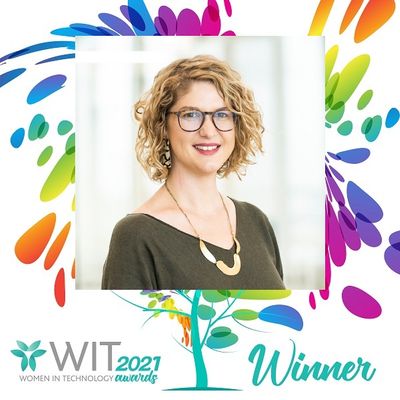
2021 Engagement Highlights
Highlights for 2021 include ‘National Science Week: celebrating the Great Barrier Reef, research with AIMS, and citizen science’ plus ACEMS Final Annual Retreat
National Science Week: Celebrating the GBR, research with AIMS & Citizen Science
Great Barrier Reef Event Series & Citizen Science Challenge
ACEMS received National Science Week Queensland seed funding to host an event series, pictured below, celebrating the Great Barrier Reef, important research with AIMS, and citizen science, together with partners including AIMS and harnessing the “Virtual Reef Diver” research and platform co-created with AIMS.
The event series was a huge success, raising public awareness about the Great Barrier Reef, attracting national and local media, a Ministerial visit, Queensland Chief Scientist support, 55,000+ citizen science classification contributions (from hundreds of members of the public, including schools across the country), and promoting ACEMS and AIMS research; plus ACEMS-supported MathsCraft program, and ACEMS PhD student Katie Buchhorn and her book “Wondrous Worlds” celebrating mathematics, amongst others.
Overview of ACEMS National Science Week 2021 Great Barrier Reef Event Series & Challenge

On the eve of National Science Week, ACEMS hosted an online launch event featuring 16 guest speakers (from AIMS, ACEMS, ReefTeach, Calypso Productions and university), and shared recordings of presentations online for further promotion via social media
- Amongst the guest speakers were researchers from AIMS who collaborate with ACEMS including: Juan Ortiz who provided an overview of AIMS, its work, and exemplar collaborative research with ACEMS; Manuel Gonzalez-Riveros who spoke about the use of AI and ML technology for reef monitoring, including the collaborative research with ACEMS; and Cherie Motti who spoke about her research at AIMS, including on COTS and microplastics, and collaborative research with ACEMS.
All guest talks are available on the ACEMS YouTube channel on this playlist.
Guest Speakers Featured by ACEMS for National Science Week 2021
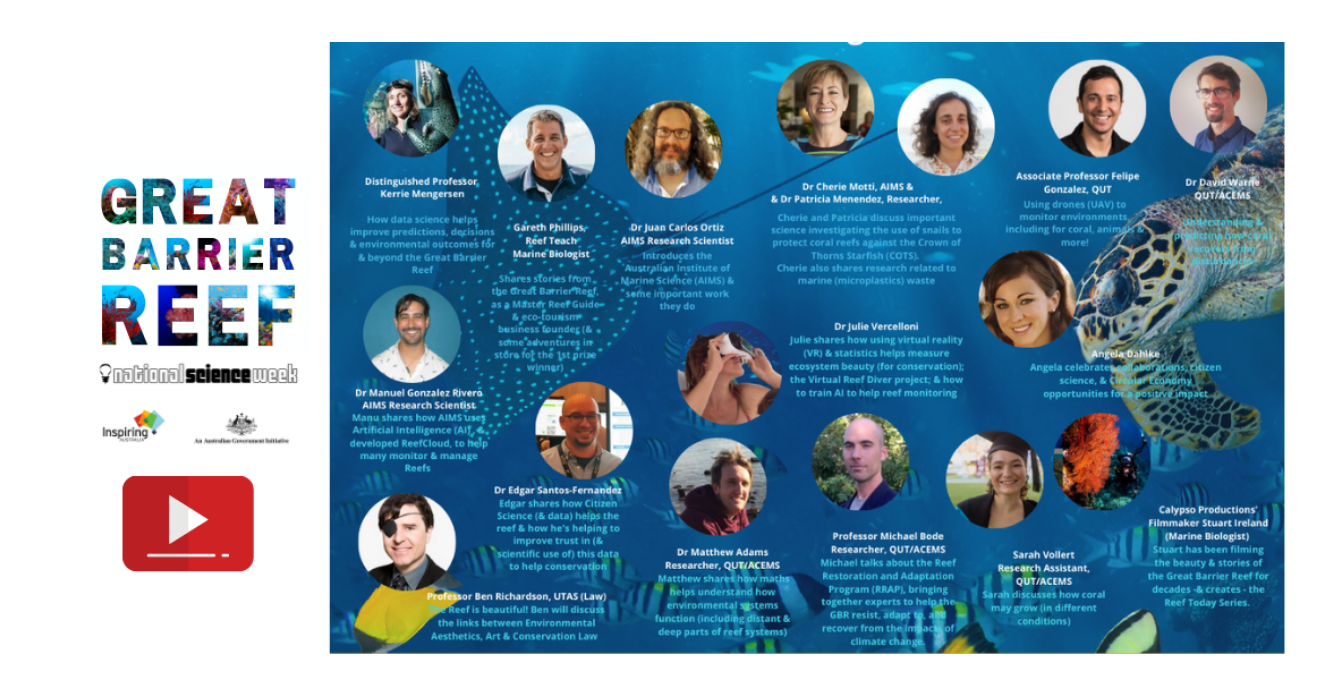
ACEMS National Science Week Launch Event Guest Speakers from AIMS
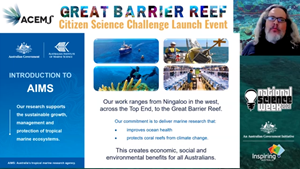
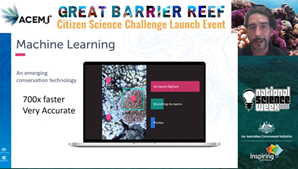
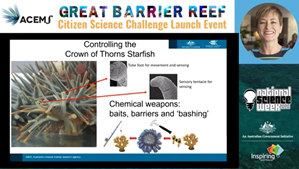
Highlight from the National Science Week launch event presentations by Dr Juan Ortiz, Dr Manuel Gonzalez-Riveros and Dr Cherie Motti
Queensland Ministerial Visit to ACEMS QUT - Promoting GBR Research & Citizen Science
Queensland Minister for the Environment and the Great Barrier Reef and Minister for Science and Youth Affairs Meaghan Scanlon MP visited ACEMS’ QUT node for National Science Week. The purpose of her visit was to meet with researchers and learn about research and citizen science relating to the Great Barrier Reef. The ministerial visit also helped to promote ACEMS National Science Week citizen science challenge.
Visit by Queensland Minister to ACEMS QUT for National Science Week



The Hon. Minister Meaghan Scanlon visited ACEMS QUT for a tour of the Cube, featuring highlights of ACEMS-AIMS research and the National Science Week citizen science Challenge, and meeting ACEMS QUT members/researchers
“Virtual Reef Diver’ Citizen Science Challenge
The National Science Week citizen science challenge invited participants to help classify images of the Great Barrier Reef via the Virtual Reef Diver platform (originally developed by ACEMS with AIMS and other partners).
The Challenge was promoted widely by the media with multiple news articles, radio interviews and television broadcasts promoting the event. The event was further promoted on social media by ACEMS, the National Science Week and many other accounts. This attracted a diverse range of participants geographically across Australian and multiple demographics, including primary and secondary school students, teachers and other interested members of the community.
Collectively, Virtual Reef Diver citizen scientists contributed 55,000+ classifications of reef images during National Science Week. This contribution adds to earlier impact realised from the project, as highlighted in this Virtual Reef Diver promotional video created with the Great Barrier Reef Legacy. This work improves our observational data and, in turn, our models and predictions of reef coral cover and health. Additionally, it supports research to improve trust in citizen science data for conservation such as research by ACEMS AI Edgar Santos Ferndandez and CI Kerrie Mengersen: https://www.nationaltribune.com.au/reef-in-two-gears-new-patterns-of-coral-recovery-discovered/.
Many of our citizen scientists developed their classification knowledge and ability to high levels, with 97 attaining the top two levels, becoming "experienced' and "super citizen scientist" classifiers. Participants efforts in helping classify coral reefs was acknowledged in an ACEMS’ Newsletter published during National Science Week: newsletter thanking participants.
ACEMS National Science Week Citizen Science Challenge - Participation and Contribution

Citizen Science Challenge Winners & Celebratory Event with Chief Scientist
ACEMS hosted a citizen science celebratory event on 10 September 2021, with VIP guest speaker Queensland’s Chief Scientist and individual and school winners of the challenge. Prizes were awarded for the top individual and team participants, plus other top performing contributors.
The prizes included the “ultimate Great Barrier Reef citizen science adventure holiday” plus ACEMS STEM research inspired Virtual Reef Diver card game, MathsCraft subscriptions and ACEMS PhD student Katie Buchhorn’s Wondrous Worlds books.
Video recordings of the event can be found on the ACEMS YouTube channel. A selection of videos featuring the event and prize winners are given below:
- Talk by VIP Guest Queensland’s Chief Scientist Professor Hugh Possingham
- Thank you video from the winning team, from St Patrick’s College Townsville
Virtual Reef Diver Citizen Science Challenge - 1st Prize - Individual and Team Winners
“Reef Today” Film Celebrating Citizen Science Winner & Their Great Barrier Reef Holiday
- Watch the “Reef Today” film featuring the winner of ACEMS National Science Week “Virtual Reef Diver” Citizen Science Challenge, high school student Teleah McGrigor, during her science adventure holiday to the Great Barrier Reef and Cairns, hosted by ReefTeach and Calypso.
Highlights from the Reef Today Film Featuring Winner Teleah McGrigor on her Holiday to the GBR with ReefTeach master reef guides and filmed by Calypso Productions
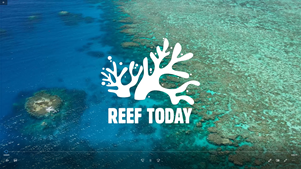
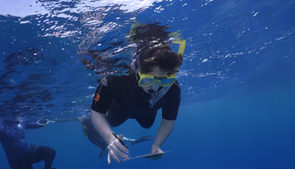
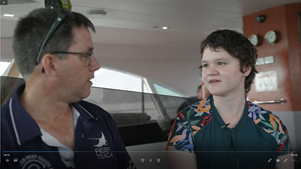
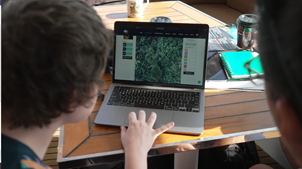
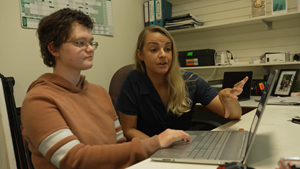

Future Opportunities:
- Schools, teachers, and students, from across Australia, have already expressed interest in participating in future challenges as “Virtual Reef Diver” citizen scientists.
- ACEMS has received letters of support from various organisations for a similar initiative in 2022 (including Queensland Office of the Chief Scientist, Reef Teach, Great Barrier Reef Legacy Foundation, and Calypso Productions).
- Grant applications have been submitted to fund and further scale such an initiative.
Quotes from National Science Week Virtual Reef Diver Citizen Science Participants
I thoroughly enjoyed the celebratory event on 10 September and would like to thank you and everyone at ACEMS and Virtual Reef Diver who helped hold such a great competition. I found classifying images of the reef a very exciting and enriching experience and I look forward to continuing to participate in this project in future… I am looking forward to seeing what happens next time.”
Samuel Soo, 2nd prize individual, student, NSW
It was a privilege to be involved in the project. I am interested to follow up on further Barrier Reef projects.”
Peter Yager, NSW Teacher, Top Honours Mention
We are very excited to have placed 1st in this challenge and the activity was incredibly beneficial for my class. The girls will be attending Orpheus Island in Term 4 where one of the activities is identifying corals and marine life as part of practising data collection and analysis… empowering youth and enabling citizen scientists is a critical tool in the future of the Great Barrier Reef. By nature of our unique location here at the Strand, we're reminded every day how incredibly important credible data is and how this can contribute to reef monitoring..."
Holly Whiting, Science Teacher at St Patrick’s College Townsville (team 1st prize)
We ran the Virtual Reef Diver as part of our activities during science week, and were very pleased with the number of boys who participated in the activity. We are very excited with the result St Greg’s achieved…Thank you very much for the prizes, and we are more than happy to enter the virtual Diver activity during science week again next year.”
John Dinnen, Leader of Learning- Science, St Gregory’s College (interstate team prize winner)
ACEMS Final Annual Retreat 2021
ACEMS was delighted to have AIMS participate in the ACEMS Final Retreat. Delegates from AIMS included PI Juan Ortiz who attended the retreat at the Queensland venue and delivered a presentation on AIMS’ Ideas Challenge project.